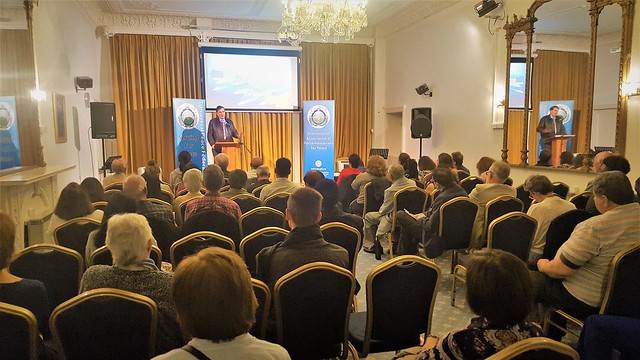London, United Kingdom—UPF-UK commemorated the UN International Day of Peace by holding a discussion on the theme “How Do We Stop the Next War?”
The event, held at the London headquarters of UPF-UK on September 21, 2017, featured as its keynote speaker Humphrey Hawksley, a writer, commentator and journalist.
Mark Brann, a director of UPF-UK and a former regional secretary general of UPF for Europe, responded, as did His Excellency Mr. Sayakane Sisouvong, the ambassador of Laos, who commented in a personal capacity.
Mr. Hawksley stated that where a dominant power has declined and is being superseded by a rising power, there is almost always a major conflict. He quoted Harvard University Professor Graham T. Allison, describing this as a “Thucydides Trap” after the Spartan-Athenian conflict; Professor Allison found that “in 12 of 16 cases in the past 500 years, when a rising power challenged a ruling power, the outcome was war.”
Mr. Hawksley added that when an awful conflict has occurred, usually a conference is held to design the shape of the international relationships to follow. He asked, “Why do we not have a conscious effort to think through what would lead to relationships that would avoid the conflict before it happens?” He provided several examples of those conferences, such as the conference that led to the Treaty of Versailles after World War I and the Peace of Westphalia that brought the Thirty Years’ War to a conclusion. His presentation concluded with a slide proposing a conference of “Eastphalia.”
Mark Brann, a director of UPF-UK and a former UPF-Europe secretary general, highlighted the need for a principled approach to foreign policy. He explained that NGOs can more easily appeal for a higher standard in foreign policy than governments, which reflect national self-interest. NGOs can more easily express the conscience of humanity.
He spoke of the Korean Peninsula tensions that are threatening to destabilize Northeast Asia. UPF co-founders Dr. and Mrs. Sun Myung Moon forged a relationship with North Korea’s Kim dynasty that was based on a reconciliation made during a brave 1991 visit to Pyongyang and subsequent investments, he said. That back-channel link is ongoing and significant in the current crisis, Mr. Brann explained. He added that the strength of the unity of the alliance between the United States, Japan and South Korea is very important to maintain peace in the Northeast Asian region.
His Excellency Mr. Sayakane Sisouvong, the ambassador of Laos, commented in a personal capacity on the horrors of a war that ended 30-plus years ago whose consequences still blight Laotian life. He was involved in the first efforts of reconciliation with the United States to find lost pilots’ remains. These efforts were very unpopular among the Laotian people, who had suffered greatly as the most bombed nation in the world.
The ambassador explained that since the US bombing in the 1970s one-third of Laos has been uninhabitable because of unexploded bombs, which regularly cause the loss of limbs. At the current rate of clearance, it will take 600 years to remove all those bombs. In addition, the “yellow rain” chemicals that were dropped on Laos to remove the foliage of the forest have caused genetic mutations among some of those born since the conclusion of the war.
Despite all this, the ambassador added that Laos is experiencing a prolonged economic boom with one of the fastest growth rates in the world. Thus, it has been important for Laotians to put the lingering feelings from the war behind them and focus on more positive developments.

